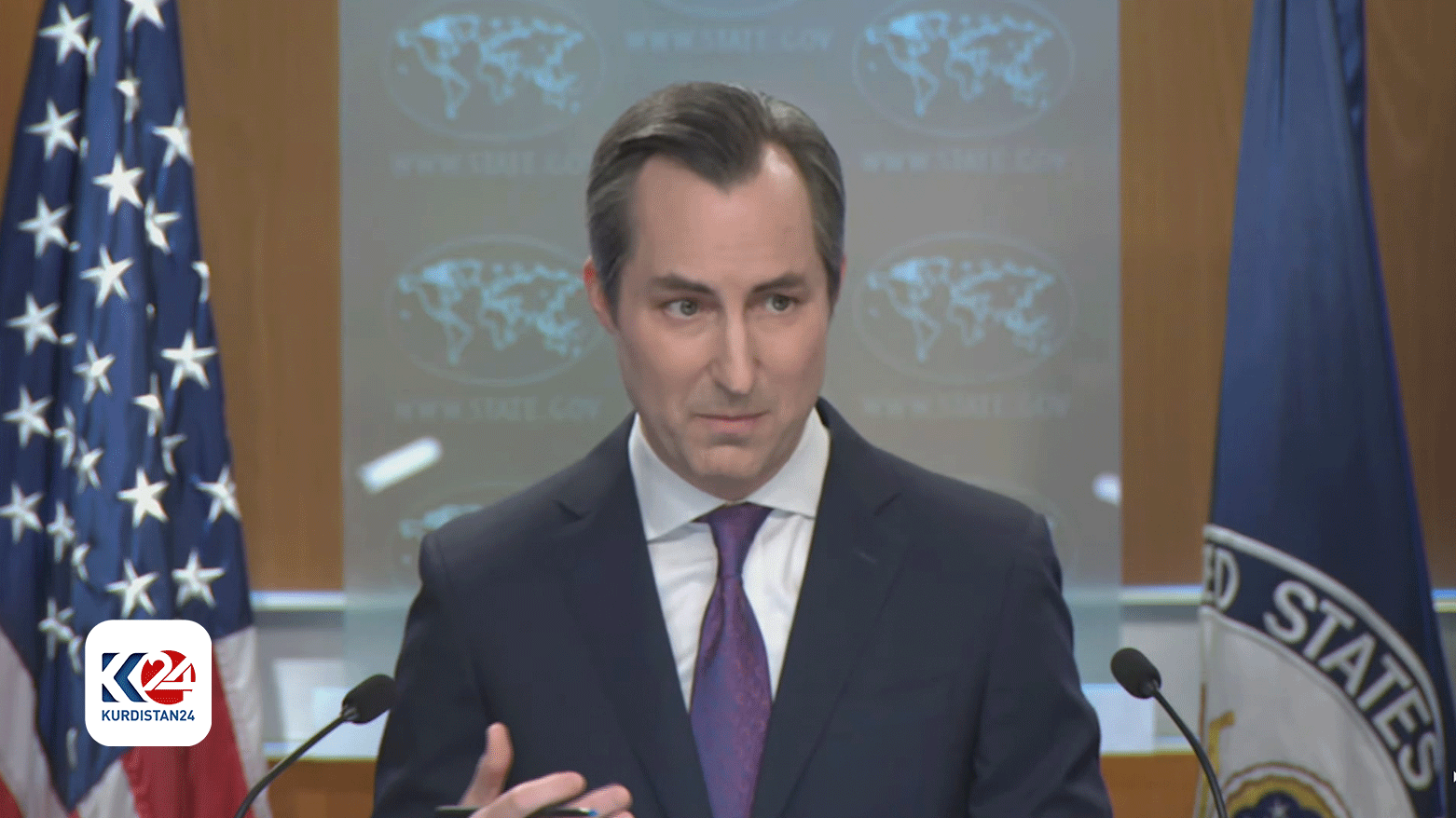U.S. Warns Against Hamas Move from Qatar to Iraq
“Terrorist organizations should stop making threats against sovereign countries,” and "they should be held responsible for their actions.”

WASHINGTON DC, United States (Kurdistan 24) – The National, an English-language newspaper based in Abu Dhabi, carried an extensive report on Monday saying that Hamas planned to shift its headquarters from Qatar to Iraq, “as pressure from Doha and the U.S. mounts” for it “to show greater flexibility in talks for a Gaza ceasefire.”
The detailed story, reported out of Cairo and Baghdad, said that the paper had been told by “sources” that “the Iraqi government approved the move last month.”
The sources also told The National that “Iran will be responsible for protecting Hamas’s leaders, offices, and personnel in Baghdad.”
State Department Spokesperson Matthew Miller was asked about that report at Monday’s press briefing.
He began by saying he did not want to speak to the validity of the report, “but we have made clear to every government in the region that there should be no more business as usual with Hanas after the horrific attacks of October 7.”
And Miller added for emphasis, “That applies to everyone.”
Hamas’s Atrocities
In its cross-border assault into Israel on Oct. 7, Hamas killed some 1,200 Israelis and abducted another 250.
“It was the deadliest day for Jews since the Holocaust,” as The New York Times has reported.
Hamas also carried out widespread sexual violence, mostly against women, but also against men. Usually, it is a much stronger military force that inflicts such atrocities on a weaker population.
The Japanese army did that to Chinese women at the start of World War II. ISIS did that to Yezidi women. Hamas, however, is the first armed force to commit such large-scale sexual violence against a much stronger power.
So what is the logic in that? Indeed, the highly-regarded Wall Street Journal columnist, Peggy Noonan, described what she called “The October Horror” as “something new.”
“This sadism was strategic,” she wrote. But what was its objective?
It did set the stage for the ongoing war, in which Israelis focus on the deaths and humiliations they suffered on Oct. 7, as The New York Times described, while most of the rest of the world has forgotten that day and, eight months later, sees only the Palestinians’ suffering on a real and daily basis.
Pro-Iranian Militias in Iraq
Iran is using the war in Gaza to mobilize the forces that it supports in the region. That includes several militias in Iraq.
Israel’s offensive in Gaza appears to be winding down, and it may well be preparing for an offensive in the north, against Hizbollah, another Iranian-backed militia, which has been regularly shelling Israel since Oct. 7.
Hizbollah claims to be acting in support of Palestinians, but it is a distinct possibility that Iran is orchestrating these tensions.
According to Iranian media, citing the Lebanese paper, al-Akhbar, sources “from the Islamic Resistance in Iraq” have reported “that the Kata’ib Hizbollah, Kata’ib Sayyid al-Shuhada, and Harakat Hizbollah al-Nujaba resistance groups have announced their readiness to fight alongside Hizbollah,” if current tensions escalate into all-out war.
Kurdistan 24 asked Miller about that on Monday. “Terrorist organizations should stop making threats against sovereign countries,” he said. “They should stop making these threats, and they should be held responsible for their actions.”
Miller also underscored that the U.S. does not “want to see any escalation of this conflict,” while a ceasefire between Israel and Hamas, which the U.S. has been promoting, “would help us resolve this situation in the north” between Israel and Hizbollah.
Iranian Support for Houthis in Yemen
Miller was also asked about Iran’s support for another Middle Eastern militia: the Houthis in Yemen, who have used the war in Gaza to attack shipping in the Red Sea and Gulf of Aden.
The journalist who asked the question noted that a CENTCOM spokesperson had said on Sunday, “There are IRGC officers in Yemen training the Houthis,” as they launch attacks on commercial ships and even U.S. naval vessels.
Miller responded by saying that the U.S. did hold Iran “responsible for the actions by the Houthis, because Iran has continued to arm the Houthis and continued to support the Houthis’ acts of terrorism.”
Indeed, Houthi attacks are leading international shipping companies to reroute their vessels, taking the much longer, but safer, route around the Horn of Africa, rather than the direct route between Europe and Asia through the Suez Canal, Red Sea, and Gulf of Aden.
Read More: U.S. Condemns ‘Houthi-Led Violence in Yemen’
That is contributing to the reemergence of a global supply chain crisis that is increasing cargo prices, “while raising the specter of waterborne gridlock that could again threaten retailers with product shortages during the make-or-break holiday shopping season,” as The New York Times reported on Monday.
“The disruption could also exacerbate inflation, a source of economic anxiety animating the American presidential election,” it continued.
Miller concluded his response to questions about the Iranian-backed militias with great bravado. However, the substance of those remarks was questionable.
“We do hold Iran responsible for its support for terrorism, including the Houthis, including Hizbollah, including Hamas, and the action that those terrorist groups take,” he said.
“That’s why you’ve continued to see us take action not just against the terrorist groups, but also against Iran for their malign activities.”
However, it is very difficult to see what impact the U.S. measures—whether against the terrorist groups or against Iran—have had. The turmoil continues.